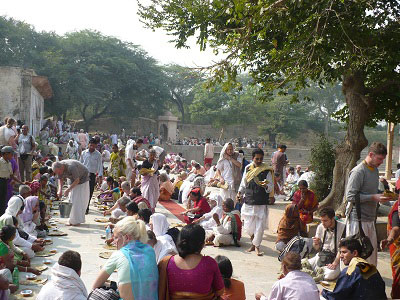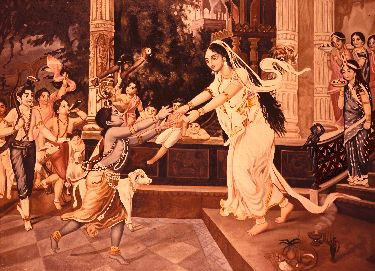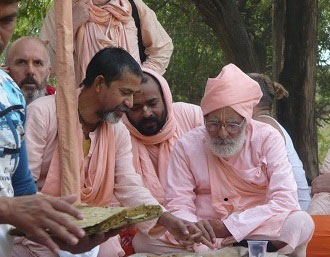Śrī Śrīmad Bhaktivedānta Nārāyana Gosvāmī Mahārāja
Springfield, Virginia: 1999
We should have more faith in the holy names of Krsna than in money and wealth. Then, quickly, Nama Prabhu (Krsna's holy names) will be merciful to us. Generally, devotees chant without faith that the holy name can give them everything. Please realize this; Krsna's names can give anything. So, chant with great love, and with a sense of having the relation with Krsna that I have explained to you. Don't 'chant;' rather 'serve.' Do you eat prasadam? Never 'eat.' To consider that we are 'eating' prasadam is an offense. Can you eat Krsna? Similarly, don't 'chant' or 'utter' harinama. Rather, serve harinama.
Don't consider that you are 'hearing' hari-katha, because your mortal ears cannot hear transcendental words. Rather, we should try to serve hari-katha, which is actually the pastimes of Krsna, thinking, "I want to serve Him."
When you are going to see the Deities, do not consider that you are seeing Them. We actually never see Them; we cannot see Them. We cannot take darsana. We should simply stand in front of Them and pray, "O, You are so merciful. Please give one glance to us. How fallen we are that we cannot even take Your darsana." We should have this mood of serving. If you consider, "I'm seeing," then you are the doer; and if you are serving, then Krsna is the doer. We should always have this mood.
 How to Honor and Serve Prasadam
How to Honor and Serve Prasadam
(Vrndavana, February,1995)
Syamarani dasi: You said that everything we do is service; so how can we further develop the attitude of service while taking maha-prasadam instead of trying to enjoy it?
Srila Gurudeva: When you take caranamrtam, you don't consider whether it is sweet or not; you simply take it. Similarly, try to serve prasadam as Sri Vigraha (Thakuraji, the Deity). We 'serve' caranamrtam, we 'serve' tulasi leaves offered to Krsna. We don't consider the taste of tulasi; we take the tulsi leaves as service.
maha prasade govinde
nama brahmani vaisnave
svalpa punyavatam rajan
visvaso naiva jayate
Maha-prasada is Krsna. Everything of Krsna is like Krsna, so we should try to serve maha-prasada. We pray, "O maha-prasada, please give us your mercy so that we can understand you and realize you; so that we can serve you; so that all worldly desires will go away; and so that krsna-prema will manifest in our hearts."
This is the speciality of maha-prasada; it gives krsna-prema. Krsna-nama, pure brahmanas, and pure Vaisnavas are all non-different from Krsna Himself. Nama (the holy name) and Nami (Krsna, the possessor of His name) are the same. "Svalpa punyavatam rajan, visvaso naiva jayate." Those who have actually served Krsna, Gurudeva, and Vaisnavas can realize all this.
We should pray in this way, and not consider the taste at all; do only this. When we see Gurudeva, we know that he is a manifestation of Krsna. He is both a servant of Krsna and Krsna's manifestation. Similarly, prasada is also non-different from Krsna, and we pray to prasada to be merciful to us.
The Glories of Prasada
Excerpts of Darsanas on Sri Vilapa-kusumanjali, Texts 47-49
Vrndavana/Mathura: December 1991, and January 1992
[In Srila Narayana Gosvami Maharaja's discourses below, he goes back and forth between saying that (a) certain pastimes of Tulasi (Rati) Manjari serving Srimati Radhika had already taken place, and (b) saying that Srila Raghunatha dasa Gosvami in the mood of Tulasi Manjari is praying for those services. This is because both are true. In Raghunatha dasa Gosvami's external consciousness (bahir dasa) he is praying with a feeling of great separation and a desire for service, and when he is in his internal consciousness, he forgets that he is Raghunatha dasa Gosvami and is absorbed in his identity as Tulasi Manjari engaged in that service. We have only included those parts of the discourse wherein Srila Maharaja is speaking directly about the prasada seva. -ed]
 Verse 47
Verse 47
nitanna-mad-vidha-lalata-tate lalatam
pritya pradaya mudita vraja-raja-rajni
premna prasur iva bhavat-kusalasya prccham
bhavye vidhasyati kada mayi tavakatvat
Translation
O Srimati Radhika, embodiment of auspiciousness! When, after I have taken the sweets you have prepared to Yasoda, will she, knowing me to be Your dasi, make me happy by touching her forehead to mine, and like a loving mother ask about Your welfare?
Commentary
Here, Srimati Radhika has ordered Tulasi Manjari to take Her sweets to Nanda Bhavan, so that when Krsna returns from cow-herding, Yasoda-maiya will give them to Him.
Tulasi Manjari is very dear to Srimati Radhika. Radhika may also order Rupa Manjari, Lavanga Manjari, or any of the other manjaris, so Tulasi Manjari prayed, "Will You order me?" Radhika became very pleased and said, "You are so dear to Me, as are Rupa Manjari, Lavanga Manjari, and all others. I am thinking that I cannot go to Nanda Bhavan now. I'm confident that if you go there and give this to Mother Yasoda, and in front of you she gives it to Krsna, it will be presented in an even more pleasant way to Krsna than if I were to personally go there. In that manner, through you, I will give these things to Krsna. You are My representative. If you are present there, serving Krsna by fanning and so many other loving activities while He takes the sweets, I will see that I'm doing it Myself. You are like myself. Go now and tell Yasoda Maiya, 'Your daughter Radhika has sent all these things.'"
Mad-vidha-lalata-tate lalatam. Srimati Radhika prepared manohara-laddu, amrta-keli, rasa-malai, rasagulla, and many other sweets. She carefully packed them all separately, placed them in a big golden pot, and covered that pot with a pure white cloth.
For some reason Rupa Manjari was not present, so in this instance Tulasi Manjari being the head of the party, took two, three, four, five, or six sakhis with her. She took the pot on her head and set off with the other sakhas, who also assisted her along the way.
Mother Yasoda was eagerly waiting at Nanda Bhavan for those sakhis, repeatedly stepping outside the door to look and then going back inside. When she finally saw them coming, she became immensely happy.
After the pot was removed from her head and put in a safe place, Tulasi Manjari bent down to put her forehead at the feet of Mother Yasoda; but when she was midway down, Yasoda caught her in her arms and embraced her, as if she were Srimati Radhika Herself. Yasoda loves Radhika no less than she loves Krsna. Out of great affection, Yasoda touched her own forehead to Tulasi Manjari's forehead, as if Tulasi Manjari were her own daughter.
Pritya pradaya mudita vraja-raja-rajni. Yasoda knows that Tulasi Manjari is a dasi of Srimati Radhika. Premna prasur iva. Raghunath dasa in the mood of Tulasi Manjari says, "Yasoda devi will inquire of me in such a loving manner, as if I am her daughter." Prasuh means 'mother, or she who gives birth to a child,' so Tulasi Manjari is like Mother Yasoda's own child. "She will ask me, "Oh, how is my beloved daughter Radhika?" and with a smiling face I will reply, "She is quite well." Bhavye vidhasyati kada mayi tavakatvat. "At that time, Mother Yasoda will show me great affection."
Verse 48
krsna-vaktrambujocchistam
prasadam param adarat
dattam dhanisthaya devi
kim anesyami te 'gratah
Translation
O Devi! Will I place before You the prasada remnants from the lotus mouth of Sri Krsna that was respectfully brought by Dhanistha?
Commentary
Srimati Radhika does not take anything other than Krsna's remnants.
In the previous verse, Tulasi Manjari prayed that Radhika will send her to Mother Yasoda with varieties of sweetmeats that Radhika has prepared: "I will go there with all these preparations, and I will offer pranam to Mother Yasoda, who will take me in her arms and give me so many blessings. Then she will ask me about the welfare of her darling daughter Radhika. I will give her all the sweets, and she will then give them to Krsna to eat."
Srila Raghunatha dasa Gosvami, in his internal absorption as Tulasi or Rati Manjari, went from Yavata to Nandagaon, where she saw Krsna return from cow-herding. Krsna was coming with so many cows and friends, and Tulasi saw that every mother first took Krsna in her lap, and then her own son. The mothers kissed and caressed Krsna first, and their own sons afterwards. When all the boys returned to their homes, Yasoda took Krsna to Nanda Bhavan, and Tulasi Manjari was watching what happened there. When she gave Yasoda the sweets and offered pranama at her lotus feet, Yasoda treated her as if Radhika Herself had come – as if Tulasi Manjari were her newly married daughter-in-law coming to her home for the first time.
Krsna took bath, and then, along with Baladeva, Nanda Baba, and all His uncles and friends, He sat down to take the prasada prepared in Yavata and sent by Srimati Radhika. All this was very tasteful for Krsna, who, after finishing His meal, went for a short rest. At that time Yasoda gave Tulasi Manjari some of the prasada that had been prepared for Krsna – not Krsna's direct remnants, but the separate prasada that had been taken from all the sweets and other preparations – to bring to Radhika. Dhanistha also gave Tulasi Manjari Krsna's remnants, which she had very carefully mixed with the rest of the prasada in a way that no one would know, and which Tulasi Manjari then brought to Yavata.
******
At the time of taking prasada in Nanda-Bhavana, Mother Yasoda, Rohini, and Dhanistha were feeding all the boys present there with Krsna. All of Nanda Baba's brothers, such as Upananda and Sunanda, were also present. Krsna sat at Nanda Baba's left side and Baladeva sat on his right side. Nanda Baba was feeding Them both, and They also fed Themselves.
Krsna's cowherd friend Madhu-mangala was also there, and by assuming various comical postures, he made everyone laugh. When Mother Yasoda gave Krsna something tasteful to eat, Madhu-mangala said, "O Mother! Krsna has an upset stomach. He cannot digest that. You can give it to me instead." Then, when Mother Yasoda placed a large quantity of prasada on Madhu-mangala's plate, Madhu-mangala said, "Oh look, a crow has come!" And when everyone looked toward that direction pointed out by Madhu-mangala, he put all his prasada on Krsna's plate and said, "I have taken everything you have given me, so give me more."
In this way everything was going on, and everyone was enjoying the feast. Sometimes Upananda and the other brothers of Nanda Baba also placed the prasada in the mouths of Krsna and Baladeva, who accepted it all very pleasantly.
When everyone rose to wash their hands, Krsna very secretly placed some of His remnants in the hands of Dhanistha. Or sometimes, in the mood that Srimati Radhika and all Her sakhis will not take anything if the remnants of Krsna are not included there, Srimati Yasoda Ma will give Dhanistha His remnants. Or, Krsna may give something to Dhanistha and say aloud, "This preparation is not very good. Give it to Radhika and tell Her that She could not prepare delicious foodstuffs." In reality that preparation is so delicious, but Krsna wants an excuse to give Radhika His remnants.
These pastimes begin the time period called pradosa-lila. [Sayana and pradosa lilas take place from sandhya, 6pm-10.48pm, and within that time this pastime took place. See endnote. –ed.] For two and a half hours, Srimati Radhika and all Her sakhis waited eagerly for Tulasi Manjari to return, and when she appeared in their midst, everyone present became so happy. They all wanted to hear about the pastimes of Krsna that she saw in Nandagaon – how He returned from cow-herding, how He entered His palace with Yasoda-devi, how He took bath, and how He enjoyed all the prasada along with Nanda Baba, Upananda, and His other relatives and friends. Govinda-Lilamrta describes all of this.
This verse states, "Krsna-vaktrambujocchistam / prasadam param adarat dattam dhanisthaya..." Yasoda Ma, or Krsna, gives Krsna's remnants to Dhanistha. Absorbed in his svarupa as Tulasi Manjari, Raghunatha dasa Gosvami prayed, "After Dhanistha has given these remnants to me, will I bring them to You?" Then, in his internal consciousness, Raghunatha dasa forgot his identity as a sadhaka and saw himself as Tulasi Manjari.
When Tulasi Manjari returned to Yavata from Nandagaon, Srimati Radhika asked her, "O Tulasi Manjari, were you present when Krsna was taking His meal?"
Tulasi replied, "I was there, but at a distance because Krsna's elders were there. I was too shy to go close."
"Did Krsna enjoy it?"
"He liked it very much."
"How did you know that He liked it?"
"Krsna glanced towards me, and with His eyes He told me how delicious it was. I also saw myself that He enjoyed it."
"Did you get a chance to render any service to Krsna? And was His stomach filled?"
"Yes, He was fully satisfied."
"How do you know?"
"I just know."
Srimati Radhika then looked into the eyes of Tulasi Manjari and, searching for Krsna there, She saw Him. How was She able to see Him? Tulasi Manjari was extremely cheerful due to seeing Krsna. Srimati Radhika thus saw Krsna in Tulasi Manjari's eyes and became so pleased. Her hairs stood on end, Her eyes welled up with tears, and Her throat became choked up so that She was unable to speak.
After this conversation, Tulasi Manjari gave Radhika Krsna's remnants, saying, "Krsna Himself secretly gave me this for You." Or, "Srimati Yasoda has sent the remnants of Krsna for her darling daughter."
Lalita, Visakha, and all the other sakhis then sat down to take prasada. Srimati Radhika gave the remnants back to Tulasi Manjari, saying, "Divide this among everyone." Therefore, in the next verse, Raghunatha dasa Gosvami prays in the mood of Tulasi Manjari, "When will I distribute Krsna's remnants to You and Your sakhis? You have not eaten anything all day because You were waiting for His remnants."
* * * * *
Text 49
nana-vidhair amrta-sara-rasayanais taih
krsna-prasada-militair iha bhojya-peyaih
ha kunkumangi lalitadi-sakhi-vrta tvam
yatnan maya kim u taram upabhjo janiya
Translation
O Kunkumangi (She whose limbs are anointed with kunkuma)! When will I carefully serve You the many kinds of remnants left by Krsna, that are like the essence of nectar, mixed with other eatables and drinks, as You sit down, surrounded by Lalita and Your other friends?
Commentary
[In Sri Caitanya-caritamrta (Antya-lila, chapter 16), Sri Caitanya Mahaprabhu speaks in the mood of Radhika as She is tasting the remnants of Sri Krsna. Regarding Mahaprabhu's pastime of taking Krsna's prasada, most of the Bengali verses (called payars) quoted by Srila Bhaktivedanta Narayana Gosvami Maharaja in his discourse below are from that place in Sri Caitanya-caritamrta – Antya-lila, chapter 16. -ed]
Krsna has taken four kinds of prasad; those which are licked, drunk, chewed, and sucked, and these four are of so many varieties; such as lassi, chutney, raita, mango, and so on.
.........
Nana-vidhair amrta-sara-rasayanais taih. Anything can be called rasayana. Here in this verse amrta-keli and other foodstuffs have been referred to, but the main subject is not food; the important thing is rasa. You may give me a fountain pen, but it is not the fountain pen that is important; it is the love in your heart that you are giving me. The pen is but the external representation of your heart. Here in this verse, the word amrta-sara, meaning 'essence of nectar' does not refer to the foodstuffs, but to the remnants of Krsna and the pastimes of Krsna.
In the mood of Tulasi Manjari, Srila Raghunatha dasa Gosvami is praying, "O Kunkumangi Radhika, "Will Dhanistha give me the remnants of Krsna, and Yasoda give me rasayana, her love for You in the form of amrta-keli and all the other preparations? Dhanistha will give me what Krsna has directly tasted and secretly left for Srimati Radhika. I will mix Yasoda's with Dhanistha's, thus making it more than nectar." It will be rasavaha, carrying rasa, just as every atom of a rasagulla is full of rasa. These preparations are very delicious, no doubt, but the fact that they are Krsna's remnants makes them so much more tasteful, and the pastimes mixing with the remnants makes them become still more tasteful.
Tulasi Manjari is praying, "I will bring this prasada to You and place it in Your hand. You will then give it to Lalita and Visakha, who will distribute it in a lonely place and all the sakhis will partake of it." Especially Radhika is relishing these remnants, but Her mind is in another place, deeply thinking of the pastimes of Krsna.
********
Sri Caitanya-caritamrta, Antya-lila chapter sixteen, describes that Sriman Mahaprabhu once went to Jagannatha Mandira to receive darsana of Lord Jagannatha. After darsana, when He returned to the Gambhira, the pujari of the Jagannatha temple sent Him a large plate of maha-prasada. Seeing the beautiful and fragrant prasada, Mahaprabhu began to weep, thinking, "Jagannatha is so kind to have sent this for Me."
"Krsnera ye bhukta-sesa, tara 'phela'-nama." The remnants of Krsna, or Jagannatha, are called phela, and a very little particle of this is called phela-lava. Krsna tasted that prasada, and in that way it had touched His lips and has thus become nectar.
After tasting this maha-prasada, Sri Caitanya Mahaprabhu began to weep and praise it: "Oh, only those who are very fortunate can taste this." What is that fortune? "Samanya bhagya haite tara prapti nahi haya." If one does not have sufficient sukrti, he will not be able to taste it.
maha-prasade govinde
nama-brahmani vaisnave
svalpa-punyavata rajan
visvaso naiva jayate
Those who do not possess sufficient pious credits will not have faith in the Holy Name, in maha-prasada, in the Vaisnavas, or in the pure brahmanas. Why? Because maha-prasada is cinmaya (transcendental), such persons will not be able to taste it. On the other hand, those who possess abundant sukrti – here sukrti means bhakti – they will be able to taste it and directly experience that it is maha-prasada.
Mahaprabhu told His associates, "I think that if someone tastes maha-prasada and serves it, he has received the full mercy of Krsna. This sukrti, or punya (spiritual pious credits), is Krsna's mercy, and without it one will be unable to realize that this is maha-prasada."
"Koti-amrta-svada pana prabhura camatkara, sarvange pulaka, netre vahe asru-dhara." When Sri Caitanya Mahaprabhu tasted that maha-prasada, He closed His eyes and began to weep. The whole day He continued to praise it, weeping and chanting harinama. For twenty-four hours He was under its influence.
Why did He weep? He was remembering the pastimes of Krsna and the cowherd boys taking prasada together, sitting in lines. Yasoda and Rohini were distributing the prasada. Nanda Baba was there, Madhu-mangala was there, and everyone was happily taking prasada.
Mother Yasoda saw that everything she was distributing was too little. Seeing Srimati Radhika cooking puris in the kitchen, she called to Her, "My dear darling daughter, come and bring more puris." When Radhika came out from the kitchen with a golden pot full of puris, Mother Yasoda asked Her to put some on Krsna's plate. Instead, Srimati Radhika quickly placed down the pot somewhere else, ran back into the kitchen, and began to tremble. Yasoda came and asked Her, "What is the matter? I called You to come and put the puris on Krsna's plate." Radhika smiled shyly, but did not say anything.
Sri Caitanya Mahaprabhu was remembering these pastimes and weeping. Having taken the bhava and complexion of Srimati Radhika, Mahaprabhu could experience how She felt as Krsna took prasada.
Caitanya Mahaprabhu told Svarupa Damodara, Raya Ramananda, and all the other devotees present with Him, "Ei dravye eta svada kahaì haite aila? krsnera adharamrta ithe sancarila." You know how tasteful are rice, dahl, grains, vegetables, milk, rabadi, koa, and laddhu; but taste this, the remnants of Krsna. How fragrant it is! How sweet it is! Certainly Krsna has tasted it and has left some remnants in this pot. Material preparations cannot be so tasteful and fragrant." Weeping, He distributed the prasada to His associates with His own hand; and upon tasting it, they all became as blissful as Him.
In the same way, Srimati Radhika took the remnants which were sent through Dhanistha, tasted some, and then divided it among Her sakhis. Tasting Her sentiments, Caitanya Mahaprabhu told His associates, "Tanu-mana karaya ksobha, badaya surata-lobha." As Radhika tasted the remnants of Krsna, the effect was that Her rati (attachment) to meet with and love Krsna increased unlimitedly. She became maddened with desire to see Krsna and to taste His lips. "Harsa-sokadi-bhara vinasaya." Radhika told Her sakhis, "Taking this maha-prasada from Krsna makes My heart feel as if I am tasting Him, seeing Him, talking with Him, and touching Him. Tasting the prasada increases My eagerness to meet with Him. Taking His remnants certainly vanquishes all of one's anxieties, lamentations, bewilderment, fear, and all other worldly emotions. All worldly desires disappear. "Pasaraya anya rasa, jagat kare atma-vasa." Every kind of desire to enjoy this material world – eating, drinking, dressing, meeting, and everything else – disappears by tasting this maha-prasada. Even shyness (shame), religion, and patience go away.
"Patience and shame are what obstructs a gopi from meeting with Krsna. She considers, 'How can I go? Everyone will see that I'm going. What will they say?' By this thinking, patience comes, and becomes an obstacle to meet with Krsna. And shame: 'What will everyone say? I should not go in front of everyone. If there is no one present, then I will go.'
"Taking His prasada clears the way, at which time one will not care for anything; whether it is day or night, or any circumstance, they will go to Krsna. "Mataya narira mana, jihva kare akarsana, vicarite saba viparita." If one is male, he will easily go at once, so what to say of females; by taking these remnants, the way becomes clear and they meet with Krsna. These remnants have so much potency." While Srimati Radhika took this prasada and also distributed it to Her sakhis, She said, "O sakhis, all of you, take this prasada.
She continued, "Although the flute is male, he desires to drink the adharamrta, the nectar of Krsna's lips. And, continually drinking, he has left nothing for us. The nectar of Krsna's lips is really meant for us, because we are of the same class as Krsna – He is a gopa and we are gopis – whereas this person is nothing but a piece of bamboo; simply dull matter. At the same time, he drinks this nectar directly in front of us, and we are helpless to do anything about it. This flute is trying to show us: 'Stay away from here. What can you do? I am taking this nectar for myself. This nectar is yours, but I am taking it.' How bold he is! He is so naughty that he is looting our property right in front of us!" Praising maha-prasada in this way, Srimati Radhika distributed it to all Her sakhis.
It was Tulasi Manjari who had brought all the prasada, so Srimati Radhika asked her, "You were so near to Krsna at that time. Which preparation was most tasteful for Him?" Tulasi Manjari replied, "Krsna loved the taste of all your preparations. He personally kept His remnants, and by His glance He told me to give it to You."
*******
Bilvamangala Thakura has written that phela-lava, the remnants of Krsna, are similar to Krsna:
premadam ca me kamadam ca me
vedanam ca me vaibhavam ca me
jivanam ca me jivitam ca me
daivatam ca me deva na 'param
(Sri Krsna-karnamrta, 104)
["O Krsna, You alone are the bestower of prema to me, the fulfiller of my internal desires, the giver of knowledge, and my only wealth. You are my life, the giver of my life, and my worshipful Deity. Besides You, there is nothing for me."]
This is a very good sloka.
Everything of Krsna is like Krsna; not less than Krsna. "Premadam ca me." In the form of Sri Caitanya Mahaprabhu, Krsna was so eager to give to all jivas prema, especially gopi-prema, that He went from door to door – sometimes in South India, sometimes in the Eastern and Western parts – all over India, giving prema in the form of krsna-nama. "Nama-prema-mala ganthi." And He distributed this with no consideration of who was qualified and who was not.
Krsna is therefore addressed as premadam, the giver of prema, and His maha-prasada remnants also bestow krsna-prema because they are like Krsna Himself. "Kamadam ca me." Krsna's maha-prasada also gives kama. What is kama? There are two kinds of madhurya-rasa: sambandhatmika (the love of Krsna's queens in Dvaraka) and kamatmika (the amorous love of the Vraja-gopis, outside of wedlock). The young Vraja-gopis are kamatmika, whereas Yasoda, Nanda Baba, Upananda, the sakhas, Arjuna, Rukmini, Satyabhama, and all others of Dvaraka are sambandhatmika. [sambandhatmika not only applies to madhurya-rasa, but to the other rasas as well. -ed]
Kamatmika is also of two types: one is direct, and the other is tat-tad-bhava-iccha-mayi, manjari-bhava, the sentiments of the nitya-sakhis and the prana-sakhis. Caitanya Mahaprabhu came to taste kamatmika sakhi-bhava and to give manjari-bhava, tat-tad-bhava-iccha-mayi, the sentiment of the palya-dasis, or maidservants, of Srimati Radhika. In the Caitanya-caritamrta, it is written that He also sometimes tasted palya-dasi-bhava. If He had not tasted it, how could He give it?
There are three-hundred sixty types of gopis, and all gopis are manifestations of the bhavas of Srimati Radhika. No gopi other than Radhika can give Krsna whatever He desires. Because Mahaprabhu was immersed in the bhava of Srimati Radhika, He tasted madhurya-rasa in every way.
Previously, all bhavas up to vatsalya (parental love) had been given, but not madhurya, and especially not manjari-bhava. Caitanya Mahaprabhu distributed manjari-bhava to the fortunate jivas, and for ordinary people He gave harinama sankirtana and the knowledge that we are all eternal servants of Krsna.
Therefore, in this verse, kamadam ca me refers to 'kamanuga,' or 'kamatmika,' and within kamanuga, tat-tad-bhava-iccha-mayi. How did He give this? By manifesting His mercy, as He did to Rupa Gosvami. He manifested His mercy in the heart of Rupa Gosvami, and also prayed to all His associates to manifest their mercy in Rupa Gosvami's heart so that he may give this manjari-bhava to the entire world.
"Vedanam ca me." Veda means 'to know.' Vedanam means 'He who gives every kind of knowledge.' By acting as both siksa-guru and caitya-guru, Mahaprabhu inspired sambandha-jnana (knowledge of one's relationship with Krsna), abhidheya-jnana (knowledge of the dealings of that relationship), and prayojana-jnana (the ultimate goal, krsna-prema) within the heart of the jivas. Caitanya Mahaprabhu or Krsna is vedanam, or caitya-guru (Krsna dwelling in the hearts of all beings as Supersoul).
"Vaibhavam ca me" means 'Krsna is my wealth, reputation etc,' so this maha-prasada is also my wealth. "Jivanam ca me" means 'He is my life,' and "jivitam ca me" means 'without krsna-prasada, or without Krsna or Caitanya Mahaprabhu, I cannot remain alive." Daivatam ca me deva naparam" means 'O, You are my worshipful Deity; You are my everything.' Prasada is also like this. Naparam means 'There is nothing besides You.' All of this can also be said for Krsna's maha-prasada, which is non-different from Him in all respects, and therefore Radhika takes nothing besides His maha-prasada. If anyone offers Her something that Krsna has not taken, She will not take it. Instead, She will give it to Krsna, and if Krsna takes it, then She will take it.
*******
We read in Brhad-bhagavatamrta how Gopa Kumara came to Goloka Vrndavana.
Krsna, Baladeva, Sridama, Madhumangala, and all other cowherd friends were sitting with Krsna and taking prasada with Him. At that time Krsna took the hands of Gopa Kumara, who in Goloka Vrndavana is the cowherd boy Svarupa, and made him sit near to Him. When all the boys were taking prasada, Yasoda Maiya placed the amrta-keli prepared by Radhika on Krsna's plate. Krsna tasted it, making a grimace as if to express that it was not at all tasteful, and put it on the plate of Svarupa. Radhika saw this from a distance, and wondered, "Why has He done that?" She knew to some extent, but not completely; it was hidden.
Svarupa is like Radhika's brother, dear both to Her and to Krsna. Krsna wanted to give him the opportunity to experience the beautiful taste of that preparation. It was the remnants of Krsna and it was prepared by Radhika, and it was therefore so sweet. As soon as Svarupa tasted it, he lost his external consciousness, thinking, "How has She made such a wonderful preparation?" All the sakhis were watching this, and Radhika was watching. When Krsna had first grimaced, they were all thinking that perhaps the preparation had no taste, but it was actually so tasteful.
Srila Raghunatha dasa Gosvami was remembering these pastimes of Srimati Radhika taking Krsna's remnants, and of Her mind going to Krsna. This is the purport of the sloka 49. In the mood of Tulasi Manjari, he prayed to Srimati Radhika, "Will You be so merciful to me that You will engage me in these varieties of services? You will tell me to go to Nanda-Bhavan, and from there I will bring You Krsna's remnants and serve You in that way."
[Endnote: (from Srila Bhaktivinoda Thakura's Sri Jaiva-dharma, chapter 38)
"Vijaya-kumara: Please tell me about the pradosa-lila (pastimes of the first part of the night).
Gopala-guru Gosvami:
tan-matuh prarthanat purvam / radhayapi tadaiva hi
prasthapyante sakhi-dvara / pakvannani tadalayam
In great excitement, Srimati Radhika cooks varieties of food preparations and sends them by Her sakhis to Krsna in Nanda-bhavan, even before Her mother-in-law orders Her to do so.
slaghayams ca haris tani / bhuktva pitradibhih saha
sabha-grham vrajet tais ca / justam bandhu-janadibhih
pakvannani grhitva tah / sakhyas tatra samagatah
bahuny eva punas tani / pradattani yasodaya
Along with His father and the sakhas, Sri Krsna repeatedly relishes and praises the varieties of preparations sent by Sri Radha, as well as many others given by Yasoda Maiya. Then Krsna goes with His father, friends, and relatives to the assembly hall where singers and dancers entertain them with sweet songs and dances.
sakhya tatra taya dattam / krsnocchistam tatha rahah
sarvam tabhih samaniya / radhikayai nivedyate
Meanwhile, the sakhis take Krsna's remnants and offer them to Radhika in a secret place. Srimati Radhika distributes them amongst the sakhis in order of seniority (and deeply absorbed
in thoughts of Him She honors them with great delight).
sapi bhuktva sakhi-varga yuta tad-anupurvasah
sakhibhir mandita tisthet / abhisarttum samudyata
After enjoying those remnants, Her sakhis decorate Her very charmingly, and She is then ready to go on abhisara (meeting with Her priyatama Syama)."]









